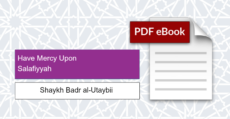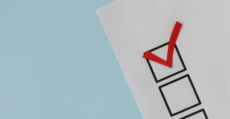Reference: https://www.ajurry.com/vb/showthread.php?t=20154
Question: Regarding knowledge and learning, what are the Islamic sciences that a student of knowledge should begin with? Is it [the science] of Hadeeth, Language, Tafseer, Usool Al-Fiqh etc…
Response: This differs of course from one student to another. A student who has graduated from primary school must study Fiqh so he is able to correct his worship which has been obligated upon him such as Salaah, Fasting and other similar rulings.
If it is said to such a person: study Usool Al-Fiqh, the sciences of Hadeeth, the biography of the narrators etc… this will firstly take him many long years and secondly the fruits of this knowledge will be seen much later in terms of understanding Halaal and Haraam. So he will live ignorant, not knowing how to perform Wudhoo properly, praying or fasting so will remain ignorant about the rulings of the religion.
For this reason, a student of knowledge should begin with studying the science of Fiqh as the Prophet (sal Allaahu alayhi wa sallam) said,
Whoever Allah wants goodness for, He gives him Fiqh of the religion [1]
However in relation to this, I must remind [you] that a student of knowledge should study Fiqh with a person of knowledge – if that is possible for him – [he should study with] a person who is well versed in the evidences of the Book and Sunnah i.e. he knows what is today known as “comparative Fiqh”. He knows the different Madhhabs, and their viewpoints on issues that the scholars differed upon.
This person of knowledge should therefore teach his student(s) what is pure and free from the various differences, because he is a scholar of the Book and Sunnah and therefore is able to implement the saying of the Most High,
{And if you disagree over anything, refer it to Allah and the Messenger, if you should believe in Allah and the Last Day} [04:59]
[This Aayah] stipulates an important condition, its understanding is: if you do not believe in Allah and the Final Day, do not return back to the Book of Allah and to the Sunnah of the Messenger of Allah (sal Allaahu alayhi wa sallam).
For this reason a person should fulfil this condition: {And if you disagree over anything, refer it to Allah and the Messenger, if you should believe in Allah and the Last Day. This is the best result} i.e. the best ending.
If studying with such a scholar (i.e. the one who is well versed with evidences) is easy for a student, he has [been blessed with] a treasure. However if this is not easy for him, then in that case he must study Fiqh according to a Madhhab. He should choose a scholar who is well-versed in one of the four Madhabs and student with him.
If Allah decrees [goodness] for him and he continues in learning knowledge and studying the intermediary branches of knowledge which we mentioned such as Usool Al-Fiqh, the sciences of Hadeeth, the biographies of narrators and the other sciences – if he continues on this path, the truth will be clear from the differing of the people.
Therefore the first method [of studying with a scholar who is well-versed in evidences of the various Madhhabs] is the best method.
However I know that it may not be possible for every student of knowledge however at the same time it is not permitted for him to remain ignorant so he has to study the Fiqh of the Ulama (i.e. the Madhhabs) however should not mix and jump between one Madhhab to another, following his own desires – misguidance after misguidance. [2]
Footnotes
[1] Narrated by Mu’awiyah, Collected by Al-Bukhaaree
[2] Clarification: Regarding this article, my respected brother Abu Khuzaimah Imran Ma’soom – may Allah reward him for his diligence – questioned the authenticity of its ascription to Shaykh Albaani (rahimahullah) due to the absence of the actual audio file.
I asked a number of Mashaykh who were close to Shaykh Albaani, and Shaykh ‘Aasim Al-Quryooti replied:
“Yes, it is affirmed from him [that they are the words of Shaykh Albaani]. I bear witness that I heard this from him in a recording however I do not recall right now the name or the number of the recording. However the Shaykh has many statements about this subject, so they should be collected and compiled so we can conclusively know his words on this important issue.”
A day later, the Shaykh then sent an audio recording saying:
The source is: Silsilah Al-Hudaa wa An-Noor, cassette number: 218.
He said: “This is a message – may Allah preserve you – from the one who heard the statement from Shaykh Albaani. And he is our brother, Shaykh Abu Khalid Waleed [unclear]. But the statement is present in the above source in number 218 of the series – may Allah preserve you.”
والله أعلم وصلى الله على نبينا وسلم.
Abul Abbaas Naveed
Thursday, 15th November, 2018.
انصراف المجتمع عن طالب العلم
المرجع: https://www.ajurry.com/vb/showthread.php?t=20154
السؤال: بمناسبة الكلام عن العلم والتعلم، ما هي العلوم الشرعية التي تنصحون طالب العلم أن يبتدأ بها؟ هل هي الحديث أم اللغة أم التفسير أم أصول الفقه، إلى آخره؟
الجواب: يختلف هذا – بطبيعة الحال – من طالب إلى آخر. طالب مثلاً متخرج من المدرسة الابتدائية، فهذا يجب أن يدرس الفقه ليتمكن من تصحيح عباداته التي فُرِضَتْ عليه، كالصلاة والصيام ونحو ذلك من الأحكام.
فإذا قيل له: ادرس ما سبق أن أشرنا إليه آنفاً، ادرس علم أصول الفقه وادرس علم أصول الحديث وادرس تراجم رواة الحديث وإلى آخره، هذا أولاً يأخذ معه سنين طويلة، وثانياً ثمرة هذا العلم – من حيث أن يفهم الحرام والحلال – سيتأخر به سنين وسيعيش جاهلاً لا يُحسن أن يتوضأ ولا أن يصلي ولا أن يصوم إلا وهو جاهلٌ بأحكام الدين.
ولذلك، فأوَّلُ ما ينبغي لطالب العلم: أن يدرس علم الفقه، كما قال عليه السلام ((من يُرِدِ اللهُ به خيراً، يُفَقِّهْهُ في الدين)). ولكن، بهذه المناسبة، لابُدَّ لي من التذكير بأنَّ طالب العلم يجب أن يدرس الفقه على عَالِمٍ وعلى رَجُلٍ – إن تَيَسَّرَ له ذلك، نعود للبحث السابق – يكون مُتَمَكِّناً في معرفة أدلة الكتاب والسُّنَّة، أي يَعْرِف ما يسمى اليوم بـ “الفقه المُقَارَن”، يعرف المذاهب وآرائهم في المسائل التي اختلف فيها العلماء، وهو – أي هذا العالم – سَيُقَدِّم لتلميذه أو تلامذته الصافي من هذه الاختلافات، لأنه عالم بالكتاب والسنة ولأنه يستطيع أن يعود إلى تطبيق قوله تعالى }فَإِنْ تَنَازَعْتُمْ فِي شَيْءٍ فَرُدُّوهُ إلى اللهِ والرسولِ إنْ كنتم تؤمنون باللهِ واليومِ الآخرِ[سورة النساء:59]
شرط عظيم جداً، مفهومه: إن كنتم لا تؤمنون بالله واليوم الآخر لا ترجعون إلى كتاب الله وإلى سُنة رسول الله صلى الله عليه وعلى آله وسلم. ولذلك ينبغي للإنسان المسلم أن (يتوفر) هذا الشرط: }فَإِنْ تَنَازَعْتُمْ فِي شَيْءٍ فَرُدُّوهُ إلى اللهِ والرسولِ إنْ كنتم تؤمنون باللهِ واليومِ الآخرِ ذلك خيرٌ وأحسنُ تأويلاً{، أي عاقبة.
إنْ تَيَسَّرَ له مثل هذا العالم، فقد وقع على الكنز الثمين. وإن لم يتيسر، فلا بُدَّ له أن يدرس – حينئذٍ – الفقه المذهبي، أن يختار عالماً متمكناً في مذهب من المذاهب الأربعة يدرس على يديه. فإذا كتب اللهُ له – مع الاستمرار في طلبه للعلم ودراسته للوسائل التي ذكرناها آنفاً من أصول الفقه وأصول الحديث وتراجم الرجال وإلى آخر ما هناك من وسائل – ففيما بعد، سيتبين له الحق مما اختلف فيه الناس. إذاً، الطريقة الأولى هي الطريقة المُثلى.
ولكني أعلم أنها قد لا تتيسر لكل طالب علم، وذلك لا يُسّوِّغ له أن يظلَّ جاهلاً، بل عليه أن يدرس فقه العلماء، لكن لا يخلط – لا يُلَفِّق – بين مذهب ومذهب فيتبع هواه، لأنَّ اتباع الهوى: مَضَلَّة ما بعدها مَضَلَّة.




Regarding the above article, my respected brother Abu Khuzaymah Imran – may Allah reward him for his diligence – questioned the authenticity of its ascription to Shaykh Albaani (rahimahullah) due to the absence of the actual audio file.
I asked a number of Mashaykh who were close to Shaykh Albaanee, and Shaykh ‘Aasim Al-Quryooti replied:
“Yes, it is affirmed from him [that they are the words of Shaykh Albaani].
I bear witness that I heard this from him in a recording however I do not recall right now the name or the number of the recording.
However the Shaykh has many statements about this subject, so they should be collected and compiled so we can conclusively know his words on this important issue.”
A day later, the Shaykh then sent an audio recording saying:
The source is: Silsilah Al-Hudaa wa An-Noor, cassette number: 218.
He said: “This is a message – may Allah preserve you – from the one who heard the statement from Shaykh Albaani. And he is our brother, Shaykh Abu Khalid Waleed [unclear]. But the statement is present in the above source in number 218 of the series – may Allah preserve you.”
والله أعلم وصلى الله على نبينا وسلم.
Abul Abbaas Naveed
Thursday, 15th November, 2018.